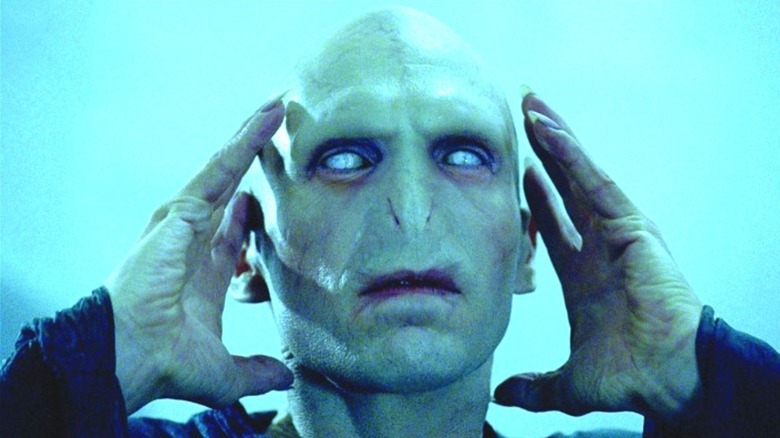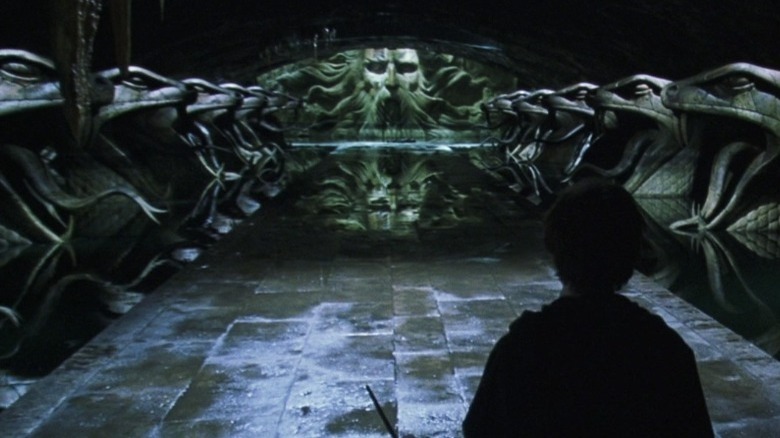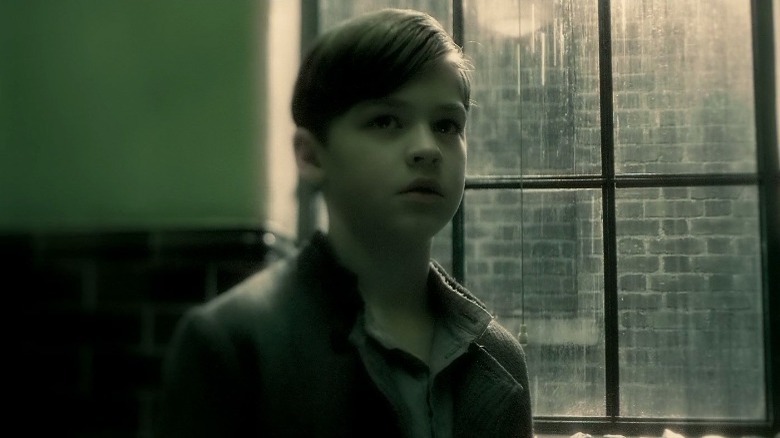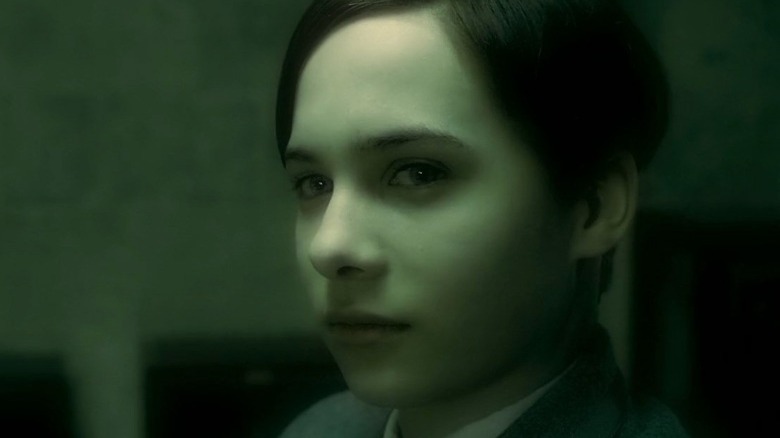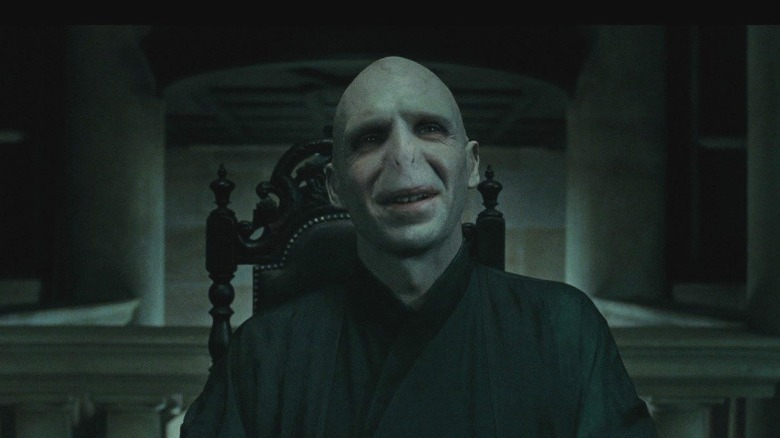How Voldemort Was Even More Evil Than You Think
One of the greatest villains of literary and film media, the dark Lord Voldemort has become synonymous with the epitome of true evil. His hatred of Harry Potter and his willingness to go to any lengths to meet his ultimate goal made him a terrifying presence in both the film franchise and the books — not to mention his ghoul-like appearance and snake nostrils in place of a nose. After years of terrorizing the Wizarding world, He-Who-Must-Not-Be-Named rose through the ranks of infamy and found his place alongside other great antagonists, such as "Star Wars" villain Emperor Palpatine and Sauron from "The Lord of the Rings."
There is no questioning Voldemort's status as a truly malevolent character, as he carries very few sympathetic traits. His only motives are a lust for power and immortality, and he lacks even an iota of compassion for humanity. His use of Horcruxes to split his soul into several pieces proves that he pays no heed to the consequences of his actions, including practicing the darkest and most forbidden of all magic. Yet some "Harry Potter" fans may not realize that there is a darker and more twisted rabbit hole that dives even deeper into the Dark Lord's levels of depravity. Here are some things about Lord Voldemort that prove his evils are even more frightening than you may realize.
The heir of Slytherin
In "Harry Potter and the Chamber of Secrets," it was revealed that Voldemort is the heir of Salazar Slytherin, one of the founding members of Hogwarts for whom the Slytherin house is named. While only a few hints are given about the man himself, it is made very clear that Salazar was a practitioner of dark magic and favored pure-blooded witches and wizards over those with Muggle ancestry. This disagreement between Salazar and the other founding members of Hogwarts led to Salazar eventually leaving the school, but not before creating the mysterious Chamber of Secrets. Salazar made the chamber to house a basilisk, with the intention that one day his heir would open the chamber and allow the deadly creature to purge Hogwarts of all students with non-magical blood.
After his death, many of Salazar's descendants shared his views of pureblood supremacy, leading to a bigoted view of Muggles and magic users with Muggle blood. In spite of Voldemort himself being a half-blooded wizard, he despises all Muggles, viewing them to be weak and inferior. Particularly, he views their mortality as a weakness, which is what motivates him to create a series of Horcruxes so that he cannot be killed (or so he once thought). Whether Voldemort's prejudice of non-pureblood wizards and witches is inherited through his bloodline, or for other reasons, has never been confirmed — but one thing for certain is that the Dark Lord's heritage has a truly sinister legacy.
Voldemort's serial killer tendencies manifested in childhood
The sixth film of the series, "Harry Potter and the Half-Blood Prince," gave audiences a peek into the early years of Tom Riddle, who would later grow up to be the dreaded Dark Lord himself. As Harry views Dumbledore's memories with the magical Pensieve, we get to see the moment when Dumbledore first meets young Tom, who is living in an orphanage. The scene is unsettling, especially when Dumbledore reveals Tom's true origins as a wizard. Tom goes on to describe his abilities, including moving things telekinetically, talking to snakes, and making "bad things happen" to other people.
While this scene reveals Tom's dark nature even as a child, there are a few things that the movie left out. For instance, in the book, it was said that the items that Tom had stolen and hidden away were actually trophies of his victims — namely, the other children of the orphanage whom he tormented. This behavior of collecting things is also a known trait of serial killers — for instance, Ed Gein's collection of furniture made from human body parts. The book also reveals that Tom killed another child's pet rabbit, and the killing of helpless animals is also an early sign of psychopathy. Maybe Dumbledore should have had Tom admitted into a mental institution instead of taking him to Hogwarts, but unfortunately, his pity for the young man would ultimately be his downfall.
Voldemort's powers of manipulation
As he demonstrates his cruelty and wickedness upon the Muggle and Wizarding worlds, it's difficult to understand why anyone would willingly follow someone as evil as Lord Voldemort — aside from the threat of torture and death, that is. Yet at one time, Voldemort had many allies on his side, and that was long before he grew into his full power as the Dark Lord.
In "Harry Potter and the Half-Blood Prince," Harry is tasked with retrieving a very important memory from the new Potions master, Professor Slughorn, which could lead to the secret source of Voldemort's powers. Slughorn is reluctant to give up the goods, however, since he is ashamed of the memory. He reveals to Harry that when Voldemort (then known as Tom Riddle) was at Hogwarts, he was a charming and brilliant young wizard who was liked and admired by all of the students and professors. He was given the title of Head Boy in his final year, and no one but Dumbledore had ever suspected young Riddle of having a darker side.
Riddle's good looks and charisma were essential traits which he used to manipulate many to his way of thinking. In fact, there were several incidents in the book in which we see Riddle's influence first hand. While working for Borgin and Burkes, he learns the location of two artifacts belonging to Hogwarts' founders — Salazar Slytherin's locket and Helga Hufflepuff's cup. He then tricks a witch named Hepzibah Smith into showing him the items before killing her and stealing them to use as Horcruxes. Once, he even convinced the ghost of Helena Ravenclaw to reveal the location of her mother's diadem. Voldemort may be a Parseltongue, but it seems that he has a tongue of silver as well.
His conception made it impossible for him to know real love
One of the biggest themes of the "Harry Potter" universe is that love is the most powerful magic. The reason Harry survived Voldemort's killing curse as a baby was because of his mother's sacrifice — Lily Potter's love for her child created a magical shield, which kept Harry from harm. As for Voldemort, his mother died shortly after he was born, and the circumstances surrounding his conception made it impossible for him to truly know love.
In the book "Harry Potter and the Half-Blood Prince," Dumbledore shows Harry a memory from the Pensieve, which explains Voldemort's origins. His mother was Merope Gaunt, a member of a once prominent wizarding family who squandered away their riches and now lived in squalor. When Merope met the handsome and arrogant Tom Riddle, her Muggle neighbor, she fell immediately in love. However, Riddle spurned her affections, and so Merope gave Riddle a love potion, and the two ran off together.
Sometime later, Merope became pregnant, and she stopped giving Riddle the love potion in the hopes that he had come to truly love her. This plan backfired, and once Riddle came to his senses, he abandoned Merope and never returned. Alone and heartbroken, Merope gave birth to a son at an orphanage and asked that he be named after his father before she died.
One of the theories which came from these series of events (even from author J.K. Rowling herself) is that because Tom Riddle, Jr. was conceived from the effects of a love potion, it made it impossible for him to truly love. Some fans believe that if Merope had lived to offer her son a mother's love, this might have countered the love potion's magic, but sadly we are only left to wonder what might have been.
